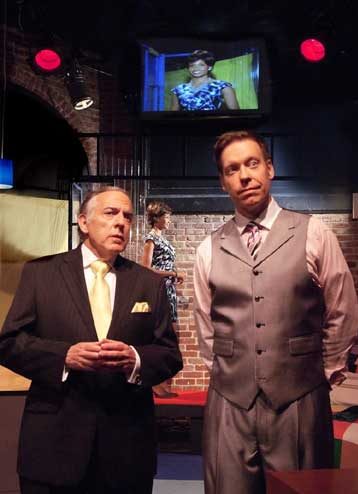Reviewed by Tracey Paleo, Gia On The Move
Are news and entertainment interchangeable?
In the West Coast premiere of Our House, currently being presented by Wasatch Theatrical Ventures at The Lounge Theatre, playwright Theresa Rebeck gives us a brilliant, gripping and darkly comic look at America’s obsession with reality television. The play shoots straight to the heart of the conflict between news and entertainment, the blurring of the lines that has occurred, and how in the zeitgeist of media we, the guinea pig audiences and it, the provocateur of ambiguity and distortion, boils down to a big hunk of nothing. Media means nothing. Has turned us into nothing. We mean nothing. We are nothing. And yet, the moronic, hyper-reality is seductive enough to keep us hooked because even the most sobering crisis can be turned into sexy entertainment.
In Our House, an arrogant, powerful network executive, faced with dwindling ratings, installs America’s favorite news anchor as host of a popular reality show. Meanwhile, in Middle America, a houseful of roommates bickers over high-stakes real- world conflicts: Merv doesn’t clean the bathroom. Someone ate Alice’s yogurt. And the rent is long past due. When reality collides with reality TV, we find ourselves front and center in a drama that holds the nation riveted with fatal consequences and a complete evisceration of accountability.
At the onset of the show before the lights even come up we are immersed into the headspace of lead character Merv. As he watches the TV screen below in his living room, playing overhead is an additional screen with a montage of overlapping, non-stop commercials for feel good products like Coca Cola, medicinals like Bayer Aspirin, assassinations, game shows, night time dramas like Dallas, hard news casters such as Mike Wallace, sports icons, images of the Justice Thomas and Anita Hill trial, and cartoons. It is a juxtaposition of truth and history versus ‘real’ fiction. And although there are visibly two screens there is no psychological separation between Merv and the audience. As old jingles play and lines spout like, “I can’t believe I ate the whole thing” made famous by Alka-Seltzer, it becomes evident that, yes, we did. We gluttonously ate the whole, sugary, fattening pie. We bought this delusion hook, line and sinker. The incessant images and messages that fade into one another without a break make no sense. We are left in a sort of barren wasteland of white noise, to figure out, almost impossibly, what is important and what to discard. But in the end are we discarding what is important for oblivion and desensitization?
In a note, Director Kiff Scholl states, “I don’t watch ‘reality television’. I’ve always felt the bread and circuses approach to entertainment leads to a numbing and dumming down of America. We all need to escape from the daily grind of our 9-5′s, but do we really need so much of it?”
Our House brings each character to his and her breaking point as we watch on three different platforms, often simultaneously, the reality of scum bag casting couch interludes where high stakes sexual favors are procured behind the scenes of America’s media decision makers, boxing us in to the depression inducing highs and lows of the illegitimate, theatrical farces we know are horribly stupid, but for which we can find no fulfilling alternative. And for TV audiences everywhere a delicious and theatrical violence gets played out in the real lives of the characters on stage. All for the simple reason that profitably in America is not optional and so therefore hyper-reality is not free.
Intriguing and poignantly written, Our House thoroughly and intelligently tackles the profundity of the issues presented. Excellent ensemble work by all of the cast who include Mark Benick as Wes the subtly ruthless TV exec; Ajarae Coleman as willing to do ‘whatever it takes’ in any situation, newscaster, Jennifer; Rachel Germaine as the simply looking for human connection, and conflicted roommate Alice; Patrick Hancock who is the definitive barometer of sense and truth in a darkening horizon of TV fog; Jennifer Kenyon as Grigsby the insightful roommate willing to draw the line; JB Waterman the peacemaker roommate and Kyle Ingleman as Merv who turns this story on its axis with a quite surprising and sagacious insight, well representing the distorted values and intelligence of addicted TV audiences, and who manages to hurt all and win all never-the-less in the process.
Excellent set design is by Dan Mailley, lighting design by Matt Richter, costume design by Sharell Martin, and sound and video design by Corwin Evans.
This review was originally published on LATheatreReview
